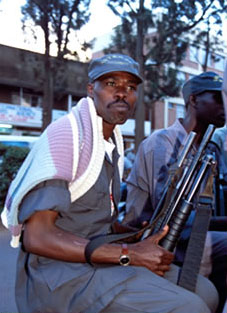In one swoop in April, authorities in Guinea-Bissau seized 635 kilogrammes of cocaine, worth an estimated $50 mn. But the traffickers managed to escape with the rest of the 2.5-tonne consignment because the police could not give chase. United Nations Office on Drug Control (UNODC) Executive Director Antonio Maria Costa commended the seizure, but lamented the poor state of policing in the West African nation. “It is regrettable that the rest of the consignment was not intercepted, but hardly surprising as the police are woefully ill-equipped and often do not even have enough gasoline to operate their vehicles.”
That same month, media reports noted that drug traffickers had established a transit area along the Gulf of Guinea as a way to elude tighter policing off the coast of Europe. Fragile states in Africa are often overwhelmed by other pressing challenges such as poverty, weak public institutions or political instability and can provide a haven for such groups. One of the illicit networks, operating in Guinea-Bissau, is made up of South American suppliers, African transporters and European distributors.
Guinea-Bissau, still recovering from a civil war that ended six years ago, is particularly vulnerable. It is one of the world’s 10 poorest nations, lacking secure prisons or adequate border patrols. “All the institutions have collapsed,” explains Mr. Koli Kouame of the UN International Narcotics Control Board (INCB). Tighter policing on the Iberian Peninsula, which has traditionally been the transit point for drugs heading for Europe from South America, is forcing the syndicates to seek alternative routes through Africa. Strategically located close to Europe and with a porous coastline made up of a labyrinth of islands, Guinea-Bissau provides an ideal sanctuary.
High demand
Demand for drugs such as cocaine is at an all-time high in Europe. A kilogramme of cocaine reportedly sells for about $80,000 in Europe, compared with $50,000 in the US, the world’s biggest market for the narcotic.
Between 2000 and 2003, African authorities managed to seize only an average of 600 kilogrammes of cocaine per year, 0.2 per cent of the drugs estimated to have been trafficked in the region during that period, UNODC noted in a report on Africa in 2005.
The case of Guinea-Bissau illustrates some of the challenges facing many poor African countries. With weak enforcement capability, underpaid officials and porous national borders, these countries provide an ideal environment for organized criminal rings to extract or tranship illicit commodities.
Africa has far fewer police per citizen than other regions. There are only 180 police per 100,000 people on the continent, while in Asia there are 363. Moreover, when police officers are underpaid and government officials are susceptible to corruption, the job of traffickers only becomes easier. Public officials can be bribed to look the other way or even be induced to work in direct collusion with traffickers.
Transnational crime syndicates deal in a wide range of illicit commodities, including narcotics, diamonds, petroleum, ivory and weapons. They also smuggle human beings. The UN has reported that 90 per cent of African countries are affected by human trafficking flows, either as a source, transit site or destination.


